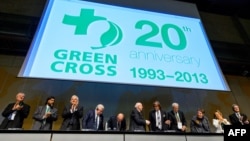GENEVA —
The Environmental Organization Green Cross International warns the world is facing a multitude of new threats, which will have severe consequences if left unchecked. Leading political, environmental and academic personalities are gathering in Geneva this week to mark the Organization’s 20th anniversary and to explore ways to tackle environmental and other global threats.
The President of Green Cross International, Alexander Likhotal, tells VOA he views the current anniversary celebrations with mixed emotions. He said he is proud of what the organization has achieved since it was launched 20 years ago. “But, of course the impact of that work could have been bigger. Therefore, though during the 20 years we have done maybe more than we planned, but less than we hoped,” he stated.
Green Cross is the brainchild of former Soviet leader, Mikhael Gorbachev. He realized many States were in deep ecological trouble and needed help to resolve their environmental problems.
He modeled the Green Cross after the International Committee of the Red Cross. However, instead of providing emergency medical aid, Green Cross applies Red Cross principles of impartiality and expediency in offering environmental solutions to countries in need.
And, those needs are growing. The United Nations reports more than 600 disasters have occurred in 2011 and 2012. Over 300 million people were affected, inflicting one-half billion dollars in economic losses.
Green Cross President Likhotal said 20 years ago, when an earthquake or other disaster occurred, the world responded by providing humanitarian aid without thinking about the environmental damage and its possible consequences.
“When Green Cross came into existence, our idea was to blend two sides of this problem because if we ignore environmental issues, they hit back very quickly. They reach the population, they damage the health of the people, they create unbearable conditions for them,” Likhotal said.
Over the past two decades, Green Cross International has been tackling the interrelated threats of nuclear arms, chemical weapons, unsustainable development, and man-induced climate change.
These threats have not gone away. But, Likhotal notes, new threats that did not exist at the time of the Cold War 20 to 25 years ago have emerged. He said it is more difficult to deal with these threats because they are more diffuse. “They cannot be associated with a specific enemy today. They are more dispersed exposures to dangers. We are exposed, all of us, to these new dangers-terrorism, climate problems, water problems," he added.
This week’s anniversary celebrations include exhibitions, cultural events and panel discussions. One highlight is an awards ceremony to honor individuals and organizations for outstanding work in preventing and responding to environmental emergencies.
A daylong Earth Dialogues Conference will cap the week’s events. Gorbachev and other eminent personalities will discuss the challenges confronting the 21st century. They aim to draw up a set of concrete proposals to tackle the ecological degradation that is threatening the health and stability of the Earth.
The President of Green Cross International, Alexander Likhotal, tells VOA he views the current anniversary celebrations with mixed emotions. He said he is proud of what the organization has achieved since it was launched 20 years ago. “But, of course the impact of that work could have been bigger. Therefore, though during the 20 years we have done maybe more than we planned, but less than we hoped,” he stated.
Green Cross is the brainchild of former Soviet leader, Mikhael Gorbachev. He realized many States were in deep ecological trouble and needed help to resolve their environmental problems.
He modeled the Green Cross after the International Committee of the Red Cross. However, instead of providing emergency medical aid, Green Cross applies Red Cross principles of impartiality and expediency in offering environmental solutions to countries in need.
And, those needs are growing. The United Nations reports more than 600 disasters have occurred in 2011 and 2012. Over 300 million people were affected, inflicting one-half billion dollars in economic losses.
Green Cross President Likhotal said 20 years ago, when an earthquake or other disaster occurred, the world responded by providing humanitarian aid without thinking about the environmental damage and its possible consequences.
“When Green Cross came into existence, our idea was to blend two sides of this problem because if we ignore environmental issues, they hit back very quickly. They reach the population, they damage the health of the people, they create unbearable conditions for them,” Likhotal said.
Over the past two decades, Green Cross International has been tackling the interrelated threats of nuclear arms, chemical weapons, unsustainable development, and man-induced climate change.
These threats have not gone away. But, Likhotal notes, new threats that did not exist at the time of the Cold War 20 to 25 years ago have emerged. He said it is more difficult to deal with these threats because they are more diffuse. “They cannot be associated with a specific enemy today. They are more dispersed exposures to dangers. We are exposed, all of us, to these new dangers-terrorism, climate problems, water problems," he added.
This week’s anniversary celebrations include exhibitions, cultural events and panel discussions. One highlight is an awards ceremony to honor individuals and organizations for outstanding work in preventing and responding to environmental emergencies.
A daylong Earth Dialogues Conference will cap the week’s events. Gorbachev and other eminent personalities will discuss the challenges confronting the 21st century. They aim to draw up a set of concrete proposals to tackle the ecological degradation that is threatening the health and stability of the Earth.




